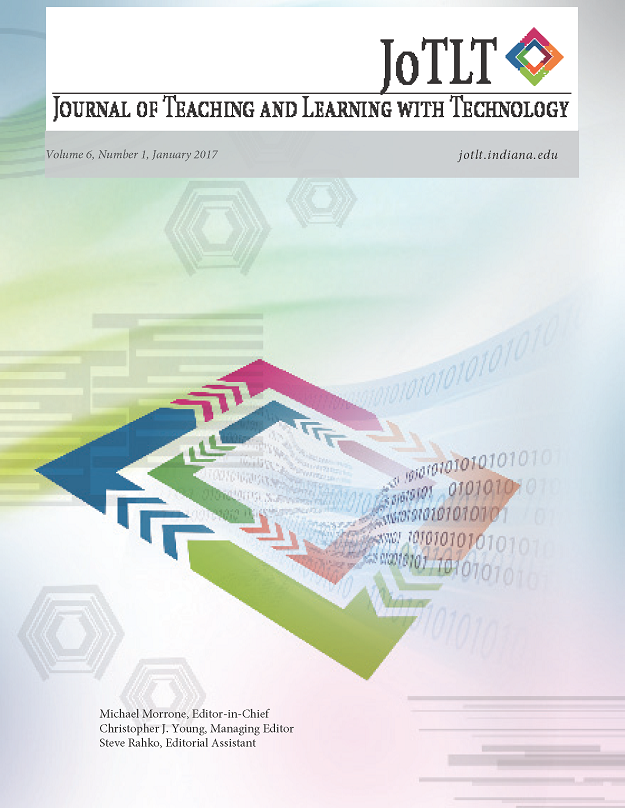Using eCoaching to Improve Practice of Novice Teacher Educators
Main Article Content
Abstract
Coaching is becoming a more widely-accepted model of support for both preservice and inservice P-12 teachers. With the use of technology such as Bluetooth headsets and live streaming, coaching has become less intrusive and more “in the moment.” In this case study, we describe the use of an eCoaching process for two PhD students who taught courses in a teacher preparation program of a higher education institution. The four-step process included (a) observing the PhD students teach, (b) collaboratively developing instructional goals with the coach, (c) providing performance feedback while coaching, and (d) reflecting on the process with the two PhD students who were teaching undergraduate courses. Findings indicate that eCoaching was well received and provided multiple opportunities for both PhD students and their coach to reflect on instruction as well as the eCoaching process. Implications for practice and future research are discussed.
Downloads
Article Details
- Authors retain copyright and grant the Journal of Teaching and Learning with Technology (JoTLT) right of first publication with the work simultaneously licensed under a Creative Commons Attribution License, (CC-BY) 4.0 International, allowing others to share the work with proper acknowledgement and citation of the work's authorship and initial publication in JoTLT.
- Authors are able to enter separate, additional contractual agreements for the non-exclusive distribution of the journal's published version of the work (e.g., post it to an institutional repository or publish it in a book), with an acknowledgement of its initial publication in JoTLT.
- In pursuit of manuscripts of the highest quality, multiple opportunities for mentoring, and greater reach and citation of JoTLT publications, JoTLT encourages authors to share their drafts to seek feedback from relevant communities unless the manuscript is already under review or in the publication queue after being accepted. In other words, to be eligible for publication in JoTLT, manuscripts should not be shared publicly (e.g., online), while under review (after being initially submitted, or after being revised and resubmitted for reconsideration), or upon notice of acceptance and before publication. Once published, authors are strongly encouraged to share the published version widely, with an acknowledgement of its initial publication in JoTLT.
References
Alberto, P.A., & Troutman, A.C. (2003). Applied behavior analysis for teachers (6th ed.). Upper Saddle River, NJ: Prentice Hall.
Bok, D. (2013). We must prepare Ph.D. students for the complicated art of teaching. The Chronicle of Higher Education, November 11, 2013.
Cochran-Smith, M. (2003). Learning and unlearning: The education of teacher educators. Teaching and Teacher Education, 19, 5–28. doi:10.1016/S0742-051X(02)00091-4
Cornelius, K.E., & Nagro, S.A. (2014). Evaluating the evidence-base of performance feedback in preservice special education teacher training. Teacher Education and Special Education, 37(2), 133-146. doi: 10.1177/0888406414521837
The Co-Teaching Scan. (Version 1.71). Charlottesville, VA: University of Virginia
Dieker, L.A., Kennedy, M.J., Smith, S., Vasquez, E., III, Rock, M., & Thomas, C.N. (2014). Use of technology in the preparation of pre-service teachers (Document No. IC-11). Retrieved from University of Florida, Collaboration for Effective Educator, Development, Accountability, and Reform Center website: http://ceedar.education.
Hattie, J., & Timperley, H. (2007). The power of feedback. Review of Educational Research, 77, 81-112. doi:10.3102/003465430298487
Israel, M. (2009). Preparation of special education teacher educators: An investigation of emerging signature pedagogies. Unpublished doctoral dissertation, University of Kansas, Lawrence.
Israel, M. Carnahan, C.R., Snyder, K.K., & Williamson, P. (2012). Supporting new teachers of students with significant disabilities through virtual coaching: A proposed model. Remedial and Special Education, 34(4), 195-204. doi:10.1177/0741932512450517
Johnson, R.B., & Christensen, L. (2014). Educational Research: Quantitative, Qualitative, and Mixed Methods Approaches (5th edition). Los Angeles, CA: Sage.
Knight, J. (2011). What good coaches do. Educational Leadership, 69(2), 18-22.
Kretlow, A.G., & Bartholomew, C.G. (2010). Using coaching to improve the fidelity of evidence-based practices: A review of studies. Teacher Education and Special Education, 33(4), 279–299. doi: 10.1177/0888406410371643
Mamlin, N. (2012). Preparing effective special education teachers. New York: The Guilford Press.
Merriam, S.B. (2009). Qualitative Research: A Guide to Design and Implementation. San Francisco: Jossey-Bass.
Scheeler, M.C., Ruhl, K.L., & McAfee, J.K. (2004). Providing performance feedback to teachers: A review. Teacher Education and Special Education, 27, 396-407. doi:10.1177/088840640402700407
Scheeler, M.C., McAfee, J.K., Ruhl, K.L., & Lee, D.L. (2006). Effects of corrective feedback delivered via wireless technology on preservice teacher performance and student behavior. Teacher Education and Special Education, 29(1), 12-25. doi: 10.1177/088840640602900103
Robb, S., Smith, D., & Montrose, B. (2012). The context of the demand for special education faculty: A study of special education teacher preparation programs. Teacher Education and Special Education, 35, 128-139. DOI: 10.1177/0888406412444760.
Rock, M.L., Zigmond, N.P., Greg, M., & Gable, R.A. (2011). The power of virtual coaching. Educational Leadership, 69(2), 42-47.
Rock, M.L., Gregg, M., Gable, R., Zigmond, N., Blanks, B., Howard, P., & Bullock, L. (2012). Time after time online: An extended study of virtual coaching during distant clinical practice. Journal of Technology and Teacher Education, 20(3), 277-304.
Rock, M.L., Gregg, M., Thead, B.K., Acker, S.E., Gable, R.A., & Zigmond, N.P. (2009). Can you hear me now? Evaluation of an online wireless technology to provide real-time feedback to special education teachers-in-training. Teacher Education and Special Education, 32, 64-82. doi: 10.1177/0888406408330872
Rock, M.L., Schumacker, R.E., Gregg, M. (2014). How are they now? Longer term effects of eCoaching through online bug-in-ear technology. Teacher Education and Special Education, 37, 161-181. doi: 10.1177/0888406414525048
Sindelar, P.T., & Rosenberg, M.S. (2003). The demand for faculty in special education: A study of searches conducted in 1997-1998. Teacher Education and Special Education, 26, 165 -171.
Smith, D., & Montrosse, B. (2012). Special education doctoral programs: A 10-year comparison of the suppliers of leadership personnel. Teacher Education and Special Education, 35, 101-113. doi:10.1177/0888406412444
